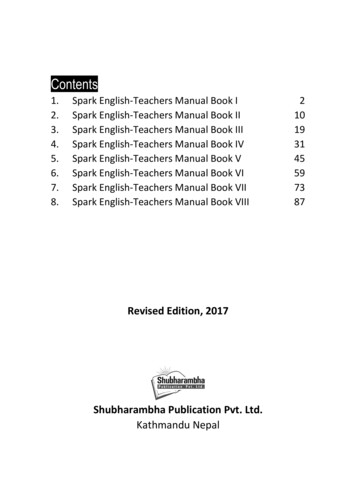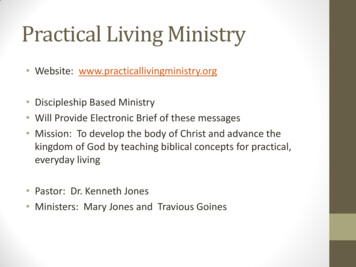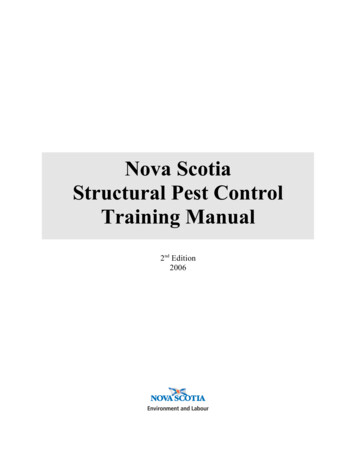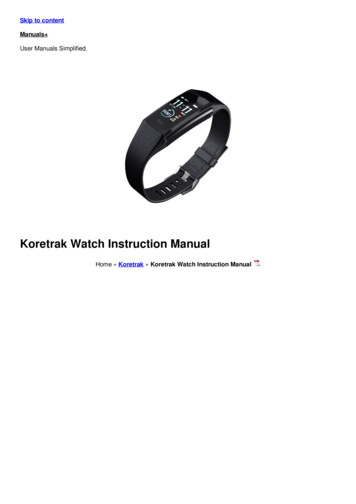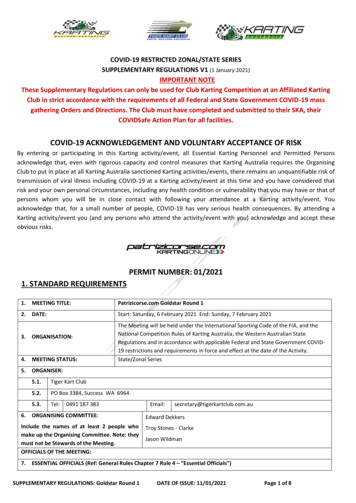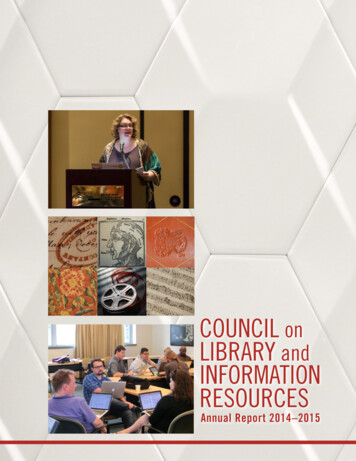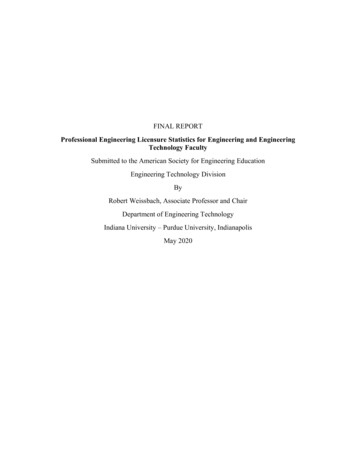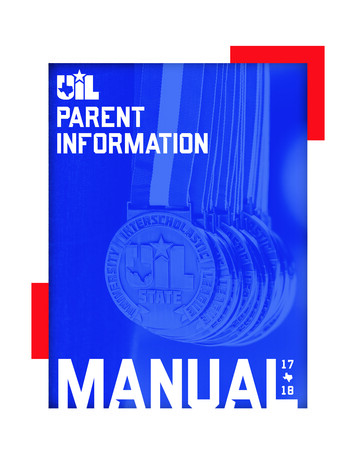
Transcription
PARENTINFORMATIONMANUAL17q18
2University Interscholastic League TABLE OF CONTENTS Letter to Parent or Guardian.3Mission of Extracurricular School Activities.4The Definition of Sportsmanship.5Code of Conduct for the Parents of Interscholastic Student-Athletes.6Parent/Coach Relationships.8Behavior Expectations of Spectators.9Pursuing Victory with Honor.10Warning About Inherent Dangers of Athletic Participation.10General Eligibility Rules. 11Required Forms.13Parent Residence Rule.15Changing Schools for Athletic Purposes.16PAPF Checklist and Flow Chart.18Previous Athletic Participation Form.22Regulations for Non-School Participation/School Camps.24Booster Club Guidelines.29Health & Safety Resources.30UIL Staff:Executive Director: Dr. Charles BreithauptDeputy Director: Dr. Jamey HarrisonDirector of Athletics: Dr. Susan ElzaChief of Staff: Kim CarmichaelAssistant Athletic Director: Darryl BeasleyAssistant Athletic Director: Brandy BelkAssistant Athletic Director: Brian PolkDirector of Policy: Leo Barnes, J.D.Director of Compliance, Eligibility and Education: Dr. Mark CousinsDirector of Officials: Ed StidhamWaiver Officer: Nakita GuilloryAthletic Staff: Bree Davis, Hannah Higgins, Jessica LaneUniversity Interscholastic LeagueP.O. Box 8028Austin, TX 78713-8028Phone: 512-471-5883 Fax: 512-471-6589Athletic Email: athletics@uiltexas.orgUIL website: www.uiltexas.org
2017-18 Parent Information Handbook3Dear Parent or Guardian:Welcome to the University Interscholastic League. The UIL is the governing body for 1,500 public high schoolsand nearly 2,100 middle and junior high schools in Texas. The UIL, which began in 1910, is the largest interschoolorganization of its kind in the world, offering 23 athletic activities to more than one million student-athletes.The purpose of the UIL is to organize and properly supervise contests that assist in preparing students to becomebetter citizens. Our aim is to provide healthy, character building, educational activities carried out under rulesproviding for good sportsmanship and fair play for all participants.Contests could not exist without rules. Therefore, UIL rules are adopted and modified by public school administratorswhose responsibility is the overall educational program of the local school district rather than individual contests.The superintendent ensures that contests remain strictly amateur and educational in nature.The UIL athletic program is based on the premise that athletes are students first and that athletic participation is aprivilege rather than a right. Students learn teamwork and group responsibility. They also learn to deal with successand to overcome adversity. Research shows those who participate in extra-curricular activities tend to make bettergrades and have fewer discipline problems than those who do not participate.Throughout this publication you'll notice references to your "student athlete", rather than your "athlete" because webelieve that your children are students first, and athletic participation is a privilege.Here are some statistics to keep in mind: There are over one million high school football players and almost one million basketball players in grades9-12 nationally. Of those numbers, about 250 make it to the NFL, and about 50 make an NBA team.The odds of a high school football player being selected to play for an NFL team are about 6,000 to 1.The odds of a high school athlete competing in the NBA are even greater.The NCAA is made up of 977 schools classified in three divisions, and less than 25,000 student athletescompete for NCAA titles annually, most of whom are not on athletic scholarships.With this in mind, it is important to focus on your student's academic career in addition to their success on theplaying field or court.This manual is provided to assist in guiding you and your child through the UIL process. Please take time to readeach section and feel free to visit our extensive web site at www.uiltexas.org. Of course you may also call any ofour staff members for clarification of any questions you may have.
4University Interscholastic League MISSION OF EXTRACURRICULAR SCHOOL ACTIVITIES One of the missions of extracurricular school activities is to serve as an extension of the classroom. There are stronglessons to be learned in athletics. One of those lessons is to set and maintain high standards of sportsmanship, ethicsand integrity in our schools and our society. It is up to us to provide the direction and constant vigilance underwhich good sportsmanship can prosper and have a positive impact on our children, the leaders of tomorrow, andourselves.We feel the need to stress the type of exemplary behavior that should be exhibited by all players and spectators atour events.The value of the lessons learned by exhibiting good sportsmanship will last a lifetime. If we ever lose sight of that,then athletics, or any co-curricular activity, is not worth sponsoring. The positive actions of a coach, athlete orspectator at an event can influence how any school is perceived in each of our communities and the communities ofthose schools that meet on the field of play.We are asking for your support in this effort by emphasizing to your son or daughter what is expected of them at anathletic event as a competitor or spectator. After all, such events are an extension of the school day, and we shouldexpect the same type of respectful behavior exhibited in the athletic arena as we do in the classroom. We urge youto ask your children to demonstrate self-control and self-discipline and at the same time, enjoy the games.Finally, we ask you to set a good example when in the stands at an event. It is only through these efforts that wecan clearly communicate what is acceptable behavior. We hope that your positive example will help set the tone forthose around you so we may all enjoy the games our athletic teams are involved in.Some sample guidelines of what we expect from our spectators are available later in this manual. When you purchasea ticket to an athletic event, you are given the privilege to view the action and to voice your support of our teams.We want that support to be in a positive tone, so that the educational value of these events is completely developedand clearly communicated to our students.
2017-18 Parent Information Handbook5 THE DEFINITION OF SPORTSMANSHIP Sportsmanship is character displayed through athletic competition. People of character live by the “Six Pillars ofCharacter,” universal values that can be used to define a good person: trustworthiness, respect, responsibility, fairness,caring and citizenship. This code applies to the parents of all student-athletes involved in interscholastic sports.TRUSTWORTHINESSAlways pursue victory with honor– Demonstrate and demand scrupulous integrity–– Observe and enforce the spirit and letter of rules – Don’tcompromise education and character-development goals – Don’t engage in or tolerate dishonesty, cheating ordishonorable conduct.RESPECTTreat the traditions of the sport and other participants with respect – Don’t engage in or tolerate disrespectful conductincluding verbal abuse of opponents and officials, profane or belligerent “trash talking,” taunting and unseemlycelebrations – Win with grace and lose with dignity.RESPONSIBILITYBe a positive role model and require the same of your student athletes – Further the mental, social and moraldevelopment of athletes and teach life skills that enhance personal success and social responsibility.FAIRNESSAdhere to high standards of fair play – Never take unfair advantage–– Be open-minded.CARINGAssure that the academic, emotional, physical and moral well-being of athletes is always placed above desires andpressures to win.CITIZENSHIPPromote sportsmanship by honoring the rules and goals of the sport – Establish codes of conduct for coaches,athletes, parents and spectators – Safeguard the health of athletes and the integrity of the sport prohibiting the useof alcohol and tobacco – Demand compliance with all laws and regulations, including those relating to gamblingand the use of drugs.
6University Interscholastic League CODE OF CONDUCT FOR THE PARENTS OFINTERSCHOLASTIC STUDENT-ATHLETES We believe that interscholastic athletic competition should demonstrate high standards of ethics, sportsmanship, and promotethe development of good character and other important life skills. We also believe that the highest potential of sports is achievedwhen participants are committed to pursuing victory with honor.TRUSTWORTHINESSTrustworthiness – be worthy of trust in all you do.Integrity – live up to high ideals of ethics and sportsmanship; do what’s right even when it’s unpopular or personallycostly.Honesty – live and act honorable; don’t allow your children to lie, cheat, steal or engage in any other dishonest orunsportsmanlike conduct.Reliability – fulfill commitments; do what you say you will do; be on time; when you tell your children you willattend an event, be sure to do so.RESPECTRespect – treat people with respect all the time and require the same of your children.Class – live and cheer with class; be gracious in victory and accept defeat with dignity; compliment extraordinaryperformance; and show respect for all competitors.Disrespectful Conduct – don’t engage in disrespectful conduct of any sort including profanity, obscene gestures,offensive remarks of a sexual nature, trash-talking, taunting, boastful celebrations, or other actions that demeanindividuals or the sport.Respect Officials – treat contest officials with respect; don’t complain about or argue with official calls or decisionsduring or after an athletic event.Respect Coaches – treat coaches with respect at all times; recognize that they have team goals beyond those of yourchild. Don’t shout instructions to players from the stands; let the coaches coach.RESPONSIBILITYImportance of Education – stress that student-athletes are students first. Be honest with your children about the likelihoodof getting an athletic scholarship or playing on a professional level. Place the academic, emotional, physical andmoral well-being of your children above desires and pressures to win.Role-modeling – Consistently exhibit good character and conduct yourself as a role model for your children.Self-Control – exercise self-control; don’t fight or show excessive displays of anger or frustration; have the strengthto overcome the temptation to demean others.Integrity of the game– Protect the integrity of the game; don’t gamble on your children’s games.Privilege to Compete – assure that you and your child understand that participation in interscholastic sports is aprivilege, not a right, and that they are expected to represent their team, school and family with honor, on and offthe field.FAIRNESSBe Fair – treat all competitors fairly; be open-minded; always be willing to listen and learn.
2017-18 Parent Information Handbook7CARINGEncouragement – encourage your children regardless of their play; offer positive reinforcement. Demonstrate sincereinterest in your child’s play.Concern for Others – demonstrate concern for others; never encourage the injury of any player, officials or followspectator.Empathy – consider the needs and desires of your child’s teammates in addition to your own; help promote the teamconcept by encouraging all team members, understanding that the coach is responsible for determining playingtime.Reprinted with the permission of the Josephson Institute of Ethics.
8University Interscholastic League PARENT / COACH RELATIONSHIPS Both parenting and coaching are very difficult vocations. By establishing an understanding between coaches andparents, both are better able to accept the actions of the other and provide a more positive experience for everyone.Parents have the right to know, and understand, the expectations placed on them and their children. Coaches have theright to know that if parents have a concern, they will discuss it with the coach at the appropriate time and place.Communication parents should expect from their child’s coach:1) Coach’s philosophy.2) Expectations the coach has for your son or daughter, as well as other players on the team.3) Locations and times of practices and contests.4) Team requirements, i.e., fees, special equipment needed, school & team rules, off-season expectations.5) Procedures that will be followed if your child becomes injured during participation.Communication coaches expect from parents:1) Concerns regarding their son or daughter expressed directly to the coach at the appropriate time and place.2) Specific concerns in regard to the coach’s philosophy and/or expectations.3) Notification of any schedule conflicts well in advance.As your child becomes involved in interscholastic athletics, they will experience some of the most rewarding momentsof their lives. It’s important to understand there may be times when things do not go the way you or your childwishes. These are the times discussion with the coach is encouraged.Appropriate concerns to discuss with a coach:1) The mental and physical treatment of your child.2) What your child needs to do to improve.3) Concerns about your child’s behavior.It is very difficult to accept your child is not playing as much as you may hope. Coaches make decisions based onwhat they believe is in the best interests of all students participating. As you can see from the list above, certainthings can and should be discussed with your child’s coach. Other things, such as those listed next, must be left tothe discretion of the coach.Issues NOT appropriate for discussion with your child’s coach:1) How much playing time each athlete is getting.2) Team strategy.3) Play calling.4) Any situation that deals with other student-athletes.There are situations that may require a conference between the coach and parent. These are not discouraged, as it isimportant for each party to have a clear understanding of the other's position. When these conferences are necessary,the following procedure is suggested to help promote resolution to the issue.If a parent has a concern to discuss with the coach, the following procedure should be followed:1) Call the coach to set up an appointment.2) If the coach cannot be reached, call the athletic director and ask him or her to set up a meeting with the coachfor you.3) Think about what you expect to accomplish as a result of the meeting.4) Stick to discussing the facts, as you understand them.5) Do not confront the coach before, during or after a practice or contest. These can be emotional times for both theparent and coach. Meetings of this nature do not promote resolution of the situation, but often escalate it.What should a parent do if the meeting with the coach didn’t provide satisfactory resolution?1) Call the athletic director to set up a meeting with the athletic director, coach, and parent present.2) At this meeting, an appropriate next step can be determined, if necessary.Students’ involvement in co-curricular activities has been proven to increase their chances of success later in life. Wehope the information contained in this manual helps make that experience more enjoyable for everyone involved.Information provided by the Iowa Athletic Council.
2017-18 Parent Information Handbook9 BEHAVIOR EXPECTATIONS OF SPECTATORS Remember that you are at the contest to support and yell for your team, and to enjoy the skill and competitionnot to intimidate or ridicule the other team or its fans.Remember that school athletics are a learning experience for students and that mistakes are sometimes made.Praise student-athletes in their attempt to improve themselves as students, as athletes, and as people, just as youwould praise a student working in the classroom.A ticket is a privilege to observe the contest, not a license to verbally assault others or be generally obnoxious.Learn the rules of the game, so that you may understand and appreciate why certain situations take place.Show respect for the opposing players, coaches, spectators and support groups.Respect the integrity and judgement of game officials. Understand that they are doing their best to help promotethe student-athlete,and admire their willingness to participate in full view of the public.Recognize and show appreciation for an outstanding play by either team.Refrain from the use of any controlled substances (alcohol, drugs, etc.) before, during, and after the game on ornear the site of the event (i.e. tailgating).Use only cheers that support and uplift the teams involved.Be a positive role model at events through your own actions and by censuring those around you whose behavioris unbecoming.Parents and spectators should be aware that the school can (and should) remove them from the premises and canprohibit them from attending future contests due to undesirable behaviors.Game officials can ask that school administrators have unruly fans removed from a contest facility.There is no such thing as a “right” to attend interscholastic athletics. Interscholastic athletics are considered a“privilege” and the spectator who avails themselves of it is expected to conduct himself or herself accordingly.Keep in mind that you are a guest of the school, and that while winning is certainly an admirable goal, it is hollowif it comes at the expense of morals, ethics, and just plain common sense.The school is responsible for the behavior of their spectators. The school district can be and will be punished foractions of patrons in violation of UIL standards and rules.
10University Interscholastic League PURSUING VICTORY WITH HONOR Basic PhilosophyWinning Is ImportantWinning is important and trying to win is essential. Without the passionate pursuit of victory, much of the enjoyment,as well as the educational and spiritual value, of sports will be lost.Honor Is More ImportantSports programs should not trivialize winning or the desire to win. To dismiss victory by saying,“It’s only a game” can be disrespectful to athletes and coaches who devote their time to being the best they can bein the pursuit of individual victories, records, championships, and medals. But the greatest value of sports is itsability to enhance and uplift the character of participants and spectators.Ethics Is Essential to True WinningThe best strategy to improve sports is not to de-emphasize winning but to more vigorously emphasize that adherenceto ethical standards and sportsmanship in the honorable pursuit of victory. Ethics is essential to winning in its truesense. It is one thing to be declared the winner; it is quite another to really win.There Is No True Victory Without HonorCheating and bad sportsmanship are not options. They rob victory of meaning and replace the high ideals of sportwith the petty values of a dog-eat-dog marketplace. Victories attained in dishonorable ways are hollow and degradethe concept of sport.Ethics and Sportsmanship Are Ground RulesPrograms that adopt Pursuing Victory With Honor are expected to take whatever steps are necessary to assure thatcoaches and athletes are committed to principles of ethics and sportsmanship as ground rules governing the pursuitof victory. Their responsibilities to demonstrate and develop good character must never be subordinate to the desireto win. It is never proper to act unethically in order to win.Benefits of Sports Come From the Competition, Not the OutcomeQuality amateur sports programs are based on the belief that vital lessons and great value of sports are learned formthe honorable pursuit of victory, from the competition itself rather than the outcome.Reprinted with the permission of the Josephson Institute of Ethics. WARNING ABOUT THE INHERENT DANGERS OF ATHLETIC PARTICIPATION Student athletes and parents should be aware that any athletic participation will always have inherent dangers.Although rare, death or catastrophic injury can result from participation in sports, and care should be taken byall concerned to minimize such dangers through the use of appropriate equipment, proper training methods andcommon sense.The UIL encourages student athletes in all sports, and their parents, to discuss risks and risk minimization withcoaches and school administrators.
2017-18 Parent Information Handbook11 GENERAL ELIGIBILITY RULES Eligibility rules are found in Section 400 and 403 of the Constitution and Contest Rules. Any question regardinga student’s eligibility, should be addressed to the school coach, principal and/or superintendent. Residencerequirements according to Sections 400, 403, and 442 should be thoroughly investigated for any student new to school.Section 400: STUDENT’S ELIGIBILITY FOR ALL UIL CONTESTSSubject to the other sections of this subchapter, an individual is eligible to participate in a UIL varsity contest as arepresentative of a member school if that individual:(a) is not a high school graduate (See Section 405);(b) is a full-time, day student in the member high school the student represents (See Section 406, academicexception, Section 906 and Official Interpretations 08-09-10, 99-04-20, 10-03-12 and 00-99-13, Appendix I);(c) has been in regular attendance at the member school since the sixth class day of the present schoolyear or has been in enrolled and in regular attendance for 15 or more calendar days before the contestor competition (student becomes eligible on the fifteenth day) (See Section 407 and Official Interpretation95-11-09, Appendix I);(d) is in compliance with rules of the State Board of Education; (See Section 404 and state law regardingcredit requirements and grades (the school shall verify a student’s grades on the basis of the officialgrade report and independently of involvement by the student);(e) has the required number of credits for eligibility during the first six weeks of school (See Section 411);(f) is enrolled in a four year program of high school courses (See Section 408);(g) initially enrolled in the ninth grade not more than four years ago nor in the tenth grade not more thanthree years ago (See Section 408 and Official Interpretation 07-04-18, Appendix I);(h) was not recruited (See Section 5 and section 409);(i) is not in violation of the Awards Rules (See Section 480); and(j) meets the specific eligibility requirements for UIL academic competition in Section 401, for musiccompetition in Section 402, and/or for athletic competition in Section 403.Section 403: ELIGIBILITY - ATHLETICSSubject to the other sections of this subchapter, an individual is eligible to participate in a UIL varsity athletic contestas a representative of a member school if that individual:(a) meets all the requirements of Section 400;(b) is less than 19 years old on September 1 preceding the contest, or has been granted eligibility based on adisability which delayed his or her education by at least one year (See Section 446);(c) did not change schools for athletic purposes (See Sections 5 and 443);(d) is an amateur (See Section 441);(e) was eligible according to Section 400 (c) (fifteen calendar day rule) and Section 403 (f) (residence rule) atthe member school the student wishes to represent prior to the deadline for district certification(non-compliance results in ineligibility only in post-district competition in that sport); and(f) is a resident of the member school district (See Section 442), and a resident of the attendance zone inwhich the member school being attended is situated,(1) or has been continuously enrolled in and regularly attending the school for at least the previouscalendar year if his or her parents do not reside within the school district’s attendance zone;see (5) (B) below for exception.Note: A student who has changed schools for athletic purposes may be declared ineligible for more than onecalendar year. See Section 443 (f) (3). For students placed on a waiting list for admittance to an open enrollmentcharter school that is a member school, the earlier of the first day of enrollment or the first day of school for theschool year following the date of application begins the time frame for compliance with the exception noted in
12University Interscholastic Leaguethis section.(2)or the student is attending a school outside the attendance zone where the parents reside becausethe school board or other appropriate authority changed district or attendance zone lines.(3)or is a transfer student from a public 8-grade ISD not containing a high school, who transferred atthe first opportunity:(A)to select a high school with geographical boundaries contiguous to his or her K-8 school;(B)to a high school for which the K-8 school attended receives state transportation funds; or(C)to the high school located nearest the student’s residence.(4)Intra-District Transfers. A student who has an option to attend more than one high school withina school district, rather than being assigned to a school according to attendance zones, iseligible at the school first selected if he/she transfers at the first opportunity. If astudent subsequently transfers to another school, the student is not eligiblefor varsity athletic competition until he/she has been in and regularly attended that schoolfor at least the previous calendar year.(5)Foreign Exchange Students.(A)Foreign exchange students are ineligible for varsity athletic contests the first year theyattend a member school unless they are granted a waiver of the parentresidence rule as outlined in Sections 465 and 468.(B)Foreign exchange students who receive a Foreign Exchange Waiver and participate inUIL varsity athletic contests during their first year in the host school may notparticipate in those same contests if they return for a second year to thehost school. The student may, however, participate in any other UIL varsity sport.See Official Interpretations 01-09-18 and 10-03-12, Appendix I(6)Charter Schools:(A)Students whose parents live within the boundaries of an independent school districtwhere a charter high school is located and opt to attend the charter high school at theirfirst opportunity to select a high school and are otherwise in compliance with varsityeligibility requirements, are eligible.(B)Students whose parents live within the independent school district where the charterschool is located, who do not select the charter high school at their firstopportunity, are ineligible for varsity athletic competition unless they have beenenrolled in and regularly attending the charter high school for at least theprevious calendar year.(C)Students whose parents reside outside the boundaries of the independent school districtwhere the charter school is located are ineligible for varsity athletic competitionunless they have been enrolled in and regularly.NOTE: Any time a student changes schools, UIL staff strongly recommends the school check the residence ofthe parent(s) for varsity athletic participation and to be sure that the student complies with local transfer andadmission policies. If the student has been continuously enrolled in and attending school for one calendar yearand the parents leave the attendance zone, check to be sure that the student complies with local admission andtransfer policies.
2017-18 Parent Information Handbook13 UIL REQUIRED FORMS Required Forms for Student Participation. It shall be the responsibility of each school to keep on file the followingrequired annual forms for each student who participates in any practice, scrimmage, or game. Forms to be filedcan be downloaded from the UIL website (www.uiltexas.org/athletics/forms). Pre Participation Physical Examination Form. As a minimum requirement, a Physical Examination Formmust be completed prior to junior high athlet
2017-18 Parent Information Handbook 7 CARING Encouragement - encourage your children regardless of their play; offer positive reinforcement. Demonstrate sincere interest in your child's play. Concern for Others - demonstrate concern for others; never encourage the injury of any player, officials or follow spectator. Empathy - consider the needs and desires of your child's teammates .




